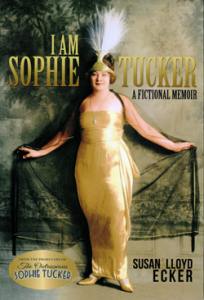I am Sophie Tucker: A Fictional Memoir by Susan and Lloyd Ecker, © 2014 Prospecta Press, ISBN 978-1-63226-006-9, 400 pages, $27.50
By Donald H. Harrison

 SAN DIEGO – As the back story is told, Susan and Lloyd Ecker went to a Bette Midler concert and heard “The Divine Miss M” pay tribute to her inspiration, the late Sophie Tucker. Intrigued by this, the couple began researching the life of Tucker, whose own nickname was “The Last of the Red Hot Mamas.” They found her voluminous file of news clippings about her career in burlesque and vaudeville, interviewed people who met her, read the memoirs of people who mentioned her, and eventually decided to write Tucker’s biography.
SAN DIEGO – As the back story is told, Susan and Lloyd Ecker went to a Bette Midler concert and heard “The Divine Miss M” pay tribute to her inspiration, the late Sophie Tucker. Intrigued by this, the couple began researching the life of Tucker, whose own nickname was “The Last of the Red Hot Mamas.” They found her voluminous file of news clippings about her career in burlesque and vaudeville, interviewed people who met her, read the memoirs of people who mentioned her, and eventually decided to write Tucker’s biography.
However, they wrote the biography in first person, not third person, in a good imitation of Tucker’s risqué voice, so I Am Sophie Tucker reads as if Tucker is telling her own story. This makes for great reading but for lousy history. Tucker, who loved publicity in her day as much as Lady Gaga likes it today, was not above making up a story about herself. So anything she said about herself needed to be taken with a dose of skepticism. Compound that with two authors putting words in Tucker’s mouth and you have a book that no serious historian would ever cite in his or her research footnotes.
On the other hand, it’s fun to read, as Tucker tells the story of how her immigrant parents changed their name from Kalish to Abuza and operated a delicatessen in Hartford, Connecticut, where as a child Tucker sang for tips. Eventually she married a no-goodnik named Tuck, and after the two split up, her last name was lengthened for stage purposes to Tucker. Notwithstanding their adopted Italian name, the Abuzas served up plenty of Jewish food at their deli, and the book is replete with references and puns about Jewish foods. Tucker, known for her girth, never met a food joke she didn’t like.
Tucker worked her way through the burlesque circuit into the vaudeville circuit, but no matter how much her paycheck increased, even to the point that she could buy her parents a new house, her mother never seemed to approve of her—a recurring theme in the book. Nothing impressed her mom, not the paycheck and not even the famous people whom Tucker seemed to collect on her travels. She could drop confidences about the likes of Thomas Edison, Samuel Clements, Giacomo Puccini, Al Capone, Fanny Brice, Irving Berlin, J. Edgar Hoover, King George VI – the list and the stories (true or not) go on and on.
I’d recommend this book for anyone who enjoys a good laugh, appreciates a risqué double entendre, and would like to gain insight into the inner workings of burlesque and vaudeville. My advice to serious historians would be to read this book with caution, treat every “fact” as a possible lead, and do your own research.
*
Harrison is editor of San Diego Jewish World. He may be contacted via donald.harrison@sdjewishworld.com